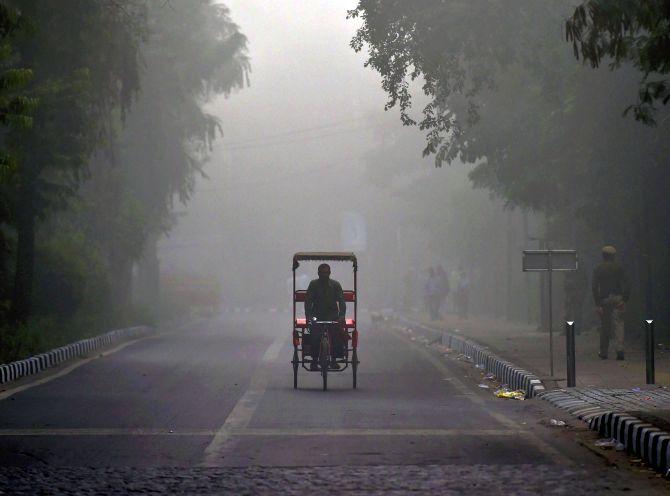'You can't consume clean air if you won't pay for it just because it's a 30-day problem,' says T C A Srinivasa-Raghavan.

Every year for the past 10 years, the National Capital Region, comprising about 55,000 square km, chokes at this time of the year because of severe pollution.
One of the many contributory factors is the burning of paddy stubble.
Paddy is harvested in early October each year.
The governments of Delhi, Punjab, and Haryana are trying to persuade farmers not to burn the stubble.
The farmers are not listening because they don't have an alternative.
As a result, an impasse has developed.
The impasse can be broken if the problem is diagnosed.
The diagnosis is that it's not the burning of stubble but the cultivation of paddy that is the problem.
Punjab and Haryana are not traditional paddy states because the crop needs a lot of water and they have less of it naturally than, say, south or east India.
But the two state governments, by making water and electricity free two decades ago, have inadvertently caused the farmers to grow paddy -- around 15 million tonnes.
This is a case of what economics calls negative externalities.
Mr A maximises his welfare at the cost of Mr B.
Mr A's actions constitute a negative externality for Mr B.
This is what the paddy stubble problem is.
One way to prevent the cultivation of paddy is to charge for the water and electricity the farmers use.
But that would reduce their incomes even further.
In a highly competitive democracy, this is not a practical solution.
So what's to be done? The Coase Theorem in economics offers a partial solution to the problem of negative externalities.
It is named after the late Ronald Coase, who was awarded the Nobel Prize for it in 1991.
Pay the polluter
The theorem rests on many ifs and buts, but its core message is that if you think it's worth your while, pay your tormentor to stop tormenting.
This, by the way, was what India and China demanded on a global scale for climate issues.
The world decided it wasn't worth its while.
So everyone is worse off now.
Anyway, to get a sense of it, consider, for example, three adjacent houses.
The middle house is richer than the two on either side.
Being much poorer, they have built their toilets along their respective compound walls, instead of indoors.
This causes a stink for the house in the middle.
The rich owner of the middle house has five options -- buy the two adjacent houses; sell his own house and move; pay the other two to build indoor toilets; persuade the government to ban toilets that are outside the house; or seek help from the courts... What should he do?
The answer depends on the cost of each option.
On the face of it, the 'build them the damn toilets' option appears cheaper, but it need not be so if the two owners turn extortionate.
This often happens.
Nor can he depend on the government because it will want their two votes against his one.
And the courts will hand down rulings that cannot be enforced.
That's why the core question: How much is it worth to the rich house-owner not to have his whole house stinking and his water supply contaminated?
No easy solutions
This is the question that the Delhi, UP, Punjab, and Haryana governments have to answer.
One way is to pay farmers not to grow paddy.
It's a lot of money for 15 million tonnes of paddy at Rs 36,000 per tonne.
This cost can be met only via a cess or a municipal tax on about 50 million people who live in the NCR.
That means about Rs 10,000 per person per year.
But questions can be asked: If you are going to pay farmers not to grow paddy, why not pay all polluters.
Thus, car owners could be paid not to drive, coal-based power plants paid to shut down, construction companies to stop construction, etc.
So we come back to the temporary cure rather than permanent prevention, namely, target the stubble.
This involves technological solutions, the equivalent of better fuel and better car engines, etc.
Some also suggest that we create a market for the stubble.
But how do you get it out in the first place? Indeed, that's why it is burnt as the cheapest form of disposal.
As you can see, there are no cheap solutions.
Someone will have to bear the cost, which has to be shared by everyone except the polluters.
But the stubble-burning problem is so temporary -- just about a month -- that no one will agree to pay.
Net net: You can't consume clean air if you won't pay for it just because it's a 30-day problem.












